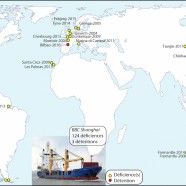Das Bato
Subject: Radioactive waste – Cherbourg => Australia. 25,000 km to Port Kembla, near Sydney.
Panorama of the performances of BBC Shanghai, German shipowner, German classification society (Germanischer Lloyd).
« The company and the ship meet all current national and international regulations concerning nuclear safety » according to AREVA.
The BBC Shanghai is hunt down throughout the world. Cherbourg let her go with a shipment of nuclear waste.
Radioactive waste : Cherbourg / Australia
A post-Fukushima realtime test is underway at the Areva reprocessing plant in La Hague, near Cherbourg. Safety is the priority, according to the director of the La Hague nuclear site.
In the same time, the BBC Shanghai is docked at Areva’s terminal in the Cherbourg harbor. She is preparing to be loaded with radioactive waste resulting from reprocessing of Australian spent fuel. This isn’t simulation, but the truth, a sad truth that is a significant safety risk. The most recent bad news to add to the BBC Shanghai’s heavy « criminal record » are 4 deficiencies on August 6, 2015 at Busan, South Korea and 6 deficiencies in Russia on August 11. The Tokyo Memorandum of Understanding, an Asia-Pacific regional agreement on maritime security, classifies the BBC Shanghai as a high-risk ship. Australia, the BBC Shanghai’s country of destination, is a signatory of the Tokyo Memorandum.
Radioactive waste – Robin des Bois (Robin Hood) is calling for an intervention by the Australian and French governments
Robin des Bois confirms the information from Greenpeace about the condition of the ship BBC Shanghai. Areva made a very bad choice in selecting her to ship back the Australian nuclear waste. These waste were produced at the La Hague plant near Cherbourg through the reprocessing of spent fuel from the Australian atomic research reactor HIFAR (High Flux Australian Reactor). The first shipment to France dates back to January 2000. At the time, COGEMA, Compagnie Générale des Matières nucléaires, which became Areva in 2006, put forward the French flag of the chartered ship, the Bouguenais, as well as the French nationality of 5 crewmembers and the presence of an officer in charge of the radioprotection on board. In spite of these positive elements, the choice of the Bouguenais was nevertheless already questionable (1).









